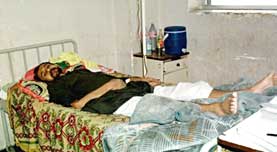| Suddenly ill after the war Leukemia, lymphomas |
  "If I didn't have this pain in my joints
and abdomen..." Basim Abd Al-Sada is
receiving a transfusion in hopes of recovery.
(Basra) "If I didn't have this pain in my joints
and abdomen..." Basim Abd Al-Sada is
receiving a transfusion in hopes of recovery.
(Basra) |
A destroyed beverage plant...houses turned to rubble...a bridge broken at the center...
After touring the scars of the bombing by
the multinational forces during the Gulf
War, I went back to Saddam Teaching Hospital
in Basra. I was given permission to talk
to some of the Gulf War veterans in the oncology
ward "as long as you don't talk too
long."
![]() An unpredictable condition
An unpredictable condition
"We have two here now, but both are in serious condition." We received a briefing from attending physician Wisam Nafie (32) as we took the elevator to the fifth floor. "We just lost another veteran to malignant lymphoma ten days ago."
In this room for four, Basim Abd Al-Sada (29) was lying in a bed by the window. Three years after the Gulf War, in 1994, he was diagnosed with chronic myeloid leukemia and has been in and out of the hospital ever since. As we talked, he was receiving a transfusion in his left arm.
"I was driving a truck for the army.
Before the war, I was carrying cargo from
Basra to Kuwait City twice a day. I was using
the highway." Al-Sada spoke in Arabic
to Wisam, who served as my interpreter. "It
was right after the American bombing began
(January 17, 1991). I was hit when I was
in Kuwait. Two guys in the bed of my truck
were killed. Another was injured very badly.
I was blown out of the driver's seat but
had no serious injury at all."
![]() Inhaled with dust
Inhaled with dust
Basin's abdomen was swollen enough to be obvious even through his black shirt. According to Wisam, his liver and spleen were both swollen and water was collecting in his abdomen.
"During the war, the dust and smoke from the oil fields was incredible. That's all these tanks and other huge things were moving around in the desert. Even without a sandstorm, sometimes you could hardly see where you were going. The toughest part was losing so many of my friends."
The road that Al-Sada drove was what the Americans called the Highway of Death. Tremendous numbers of Iraqi troops were killed along that road, and vast quantities of depleted uranium (DU) munitions were used there. Wisam believes that Sada breathed DU particles into his body along with the dust.
However, Al-Sada knows only that he has "anemia." He has never heard the word "depleted uranium" and knows nothing of its effects. Al-Sada, who left the military in 1994 because of illness, got married that year. He has a four year old son. "Before I got sick, I could work forever and never get tired. But afterwards, I've had joint pain and have not been able to work at all. I'm not worried because my father is taking care of us financially. I'm looking forward to getting well and going home."
Al-Sada smiles, his beautiful white teeth
gleaming through a thin dark beard. He does
not know that his diagnosis was changed during
this visit from chronic to acute.
![]() Patients Continually Increasing
Patients Continually Increasing
"The veteran in the next bed is Malik Kadhim Zamil. He's 36 years of age. He was diagnosed with acute leukemia one week ago and is already bleeding from the gums. He is in dangerous condition." So saying, Wisam takes Malik's pulse.
As a truck driver drafted for the infantry, Malik was stationed in northern Saudi Arabia, close to Kuwait. "While we were retreating, we were continually being bombed and straffed. Lots of my friends all around me got killed." He spoke to the doctor with difficulty because of his bleeding.
During the war, he was never injured or sick. In 1992, after getting out of the military, he was a middleman selling tomatoes and vegetables to raise his six children. "Until a week ago, I was in perfect health. Then suddenly, this..."
Malik seemed unable to believe the sudden, intense change in his body.
"Gulf War veteran cancer patients have increased steadily during this past four or five years. Furthermore, the vast majority of the cancers we see are leukemia and lymphoma, which are known to be related to radiation." Wisam insists that the situation is impossible to explain without blaming it on DU.